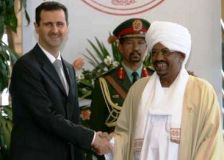Sudanese president says will not accept UN force in Darfur
Mar 28, 2006 (KHARTOUM) — Sudanese president, Omar Hassan al-Bashir, in a speech at the 18th Arab summit Tuesday that Khartoum would not accept the deployment of foreign troops in the country’s war-torn Darfur region.
 Al-Bashir has said that AU troops are capable of playing a peacekeeping role in Darfur and there is thus no need for international troops.
Al-Bashir has said that AU troops are capable of playing a peacekeeping role in Darfur and there is thus no need for international troops.
“The AU troops, after their experience and real practice in resolving conflict in Africa, are completely capable of playing their role without international intervention”, he said.
We renew our call to the international community, as well as our Arab and African brothers, to provide the necessary financial support to these troops and to increase the participation of Arab and African troops in the mission by the the required nimbers, so that the AU can continue playing its role” Bashir further said.
However, First Vice President Salva Kiir told Reuters that U.N. forces could enter Darfur even before such an agreement was signed, provided they had a clear mandate so that they did not become entangled in the conflict.
This divergence illustrates the dissidences within the Sudanese government about the UN takeover in Darfur. The Second Vice President Ali Osman Taha was also been denigrated by his National Congress Party over statement favourable to the UN presence in Darfur after the conclusion of a peace deal with the rebels.
Sudanese President praised the Arab League for its support in the reconstruction of southern Sudan.
Addressing the 18th Arab League summit, which opened 28 March in the Sudanese capital Khartoum, the president said Sudan’s first priority was the restoration of peace and security all over the country.
However, President Bashir added that Sudan will not attain comprehensive peace as long as conflict continues in the western Darfur region.
Peace in Sudan “will not be complete until war ends in another beloved part of our country, that is Darfur”, he said.
In this regard, the president expressed the country’s determination to solve the Darfur issue peacefully through peace talks with the Darfur rebels.
The 7,000-strong African Union force, which was deployed in 2004, agreed on March 10 to continue for six more months its mission, which is already being largely financed by the United States, Canada and the European Union.
The Security Council voted Friday to keep U.N. peacekeepers in Sudan to monitor an accord ending a 21-year civil war and authorized planning for the expected extension of the U.N. force’s operations to Darfur.
(ST)
